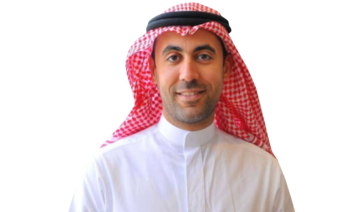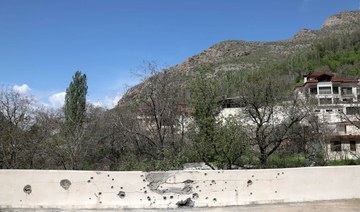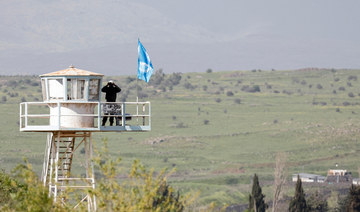Total investments in the twin industrial cities of Jubail and Yanbu have reached SR 800 billion, according to Prince Saud bin Abdullah bin Thunayan, chairman of the Royal Commission (RC).
Speaking to reporters on the sidelines of the World Economic Forum (WEF) in Amman, he called for the economic integration of Arab countries by carrying out joint investment projects.
He said the Saudi government’s move to promote the industrial sector, especially petrochemicals and minerals, was a strategic option to accelerate its diversification drive.
“Custodian of the Two Holy Mosques King Abdullah launched a number of new industries in Jubail and Yanbu valued at more than SR 400 billion,” he said.
He said the RC has invested about SR 10 billion for the development of infrastructure in the new Ras Al-Khair industrial city. Work on a 85-km road between Jubail and Ras Al-Khair has been completed.
He revealed plans to open new industries in Jubail and Yanbu.
Mohammed Al-Mady, vice chairman and CEO of SABIC, said the WEF was a golden opportunity for Arabs to discuss vital economic, political and social issues and find viable solutions to them. He backed Prince Saud’s call urging Arab countries to promote partnership in economic, investment and trade sectors. “Arab interest demands the need to give priority to investing in Arab countries as it would strengthen Arab economies,” Al-Mady said.
Joint investments for Arab economic integration stressed
Joint investments for Arab economic integration stressed
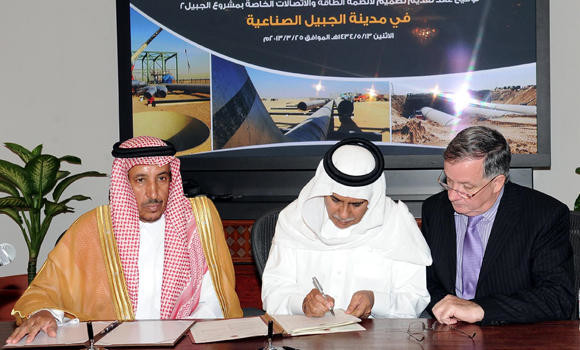
‘Asia’s largest nursery’ in Pakistan’s Pattoki awaits government support to bolster Gulf exports
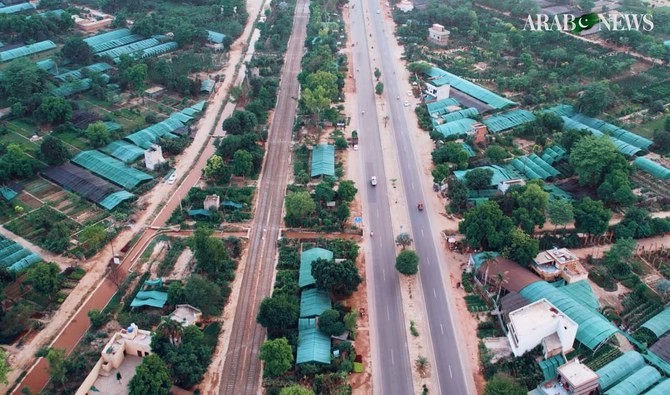
- Agriculture department says no other place worldwide where nurseries sprawl whole city
- Plant exporters urge government to lift ban on import of seeds and new plant varieties
Pattoki, PAKISTAN: From a bird’s-eye view, dozens upon dozens of nurseries can be seen dotting the city for several kilometers, featuring colorful flowers, massive trees and decorative plants. Around them, hundreds of workers flit about planting and trimming plants and plucking weed from the ground and out of clay pots.
This is a scene from Pattoki, a city in the Kasur district of Pakistan’s most populous Punjab province, that exporters and government officials say is the largest nursery market in Asia. Spread over a thousand hectares, the market employs around 100,000 people directly or indirectly.
“This [nursery] is spread over ten villages and each village’s population is estimated to be around 10,000 people,” exporter Lala Shaukat told Arab News in Pattoki last week. “This is a profitable business and people are earning well from it, and this [Pattoki] has become Asia’s biggest [nursery] market.”
“Pattoki is indeed Asia’s largest nursery due to its sprawl at a single place, in one city, and this is the biggest market in Pakistan from where the plants and flowers are not only supplied across the country, but also exported to Saudi Arabia, UAE and other Gulf countries,” said Dr. Basharat Saleem, a deputy director at the Punjab general agriculture directorate.
In Pattoki, an average nursery is spread over ten hectares with 30-40 gardeners taking care of around 350 types of plants and flowers that are sold both locally and exported.
“Around 350 varieties [of different plants] are available with us [at this nursery], including palm trees and shadow trees,” Bilal Ahmed, a nursery owner, told Arab News. “Then there are fruit plants and flower plants which are available with us in abundance.”
GULF EXPORTS
Exporter Sheraz Ali said Pakistan’s plants and flower exports to Gulf countries had increased since 2018 from around 15 containers yearly to 250 in 2024.
“In one container, around 10,000-12,000 plants are going [exported] and its value is around 3 million ($10,782) to 3.5 million rupees ($12,578),” Ali told Arab News. “In one acre, an average of 40,000-50,000 plants [are being planted].”
The plant protection department agreed with Ali, saying at least 250 containers were shipped yearly, with the Gulf region being a major destination.
“The exports of our plants and flowers have registered a significant increase in the Gulf region in the last couple of years, and the exporters’ number of 250 shipping containers for this year seems to be true,” said Dr. Khalid Zafar, a deputy director at the plant protection department, who said exact export numbers were not readily available with his department at the moment.
Saudi Arabia and the UAE were the closest destinations to Pakistan where shipments could reach within a week, exporters said. .
“We have been focusing on roses as per their demand to export them to bring dollars to our market, so that it could play a role in our country’s progress,” Ali added.
For consignments that have to be exported, plants and flowers are transferred from clay pots to a soilless medium known as coco peat. This is a necessary step as globally exporting clay from one country to another is banned for fear that soil could transfer viruses and bacteria.
“First of all, to export to Saudi Arabia, Dubai and all these Arab countries, there should be soilless media as you cannot transfer clay from one country to another because it may contain viruses, bacteria and there is a huge chance of the spread of diseases so you can make it soilless,” Ali explained.
“So we import coco peat from Sri Lanka to make it soilless and then use it in plants after taking it through a certain process.”
“GOVERNMENT SUPPORT”
Pakistani traders and growers, however, said despite the nurseries and flower markets being a “billion-dollar industry,” farmers were struggling to grow new varieties of plants and flowers and bag more orders from abroad.
“Dubai, Saudi Arabia, Kuwait, Oman, it is a huge market for us. I am exporting to only one country, Dubai [UAE], and the quantity to other countries is negligible,” exporter Shaukat, who has been in the business for 30 years, said. “We need the government’s assistance to boost exports. The government should cooperate with us and our exports can witness a huge increase. Unless we are presented as an industry, we cannot increase our exports.”
Shaukat said the government’s decision to ban the import of plants and seedlings to Pakistan had damaged business because growers could not bring in new varieties of plants.
“The world demands new varieties of [plants] as people don’t like the fifty-year-old variety,” Shaukat told Arab News.
Ahmed, the nursery owner, agreed that government support and incentives were key to the industry’s future growth.
“This is a billion-dollar industry in Pakistan and there is no focus of the government or any institution on it,” he said as he walked through a row of plants.
“If there is focus, this billion-dollar industry can earn huge revenue for both the government and farmers.”
Johnson Controls Arabia celebrates export milestone of Saudi-made scroll chillers to US
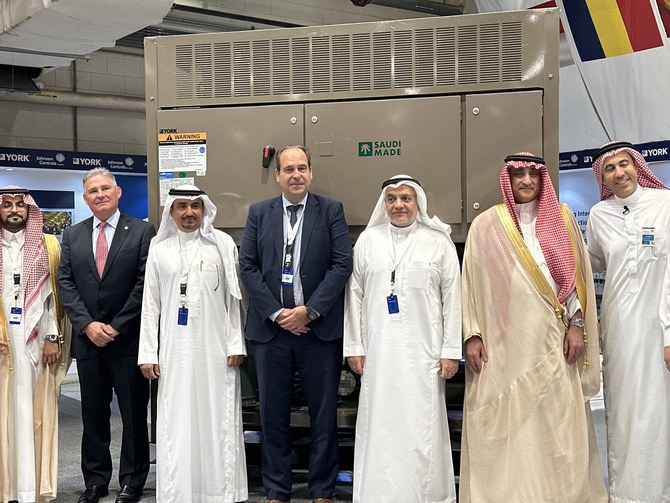
JEDDAH: A batch of 300 Saudi-made scroll chillers are set to be exported to the US in what is a first for the Kingdom, the CEO of Johnson Controls Arabia has announced.
Speaking to Arab News, Mohamad Al-Shaikh revealed the market value of the products stands at SR100 million ($26.66 million), and the shipment will come from the Johnson Controls Arabia Manufacturing Complex in King Abdullah Economic City.
Though the domestic demand for heating, ventilation, and air conditioning equipment and technology is growing, the total addressable market for Saudi Arabia is still small compared to the global demand, the executive said.
Reflecting on the milestone of the company’s largest export order to date, Al-Shaikh said: “It is a very proud moment for us as a Saudi company to reach a level where our Saudi-made products are compliance competitive to meet all the quality requirements according to the specification for the United States’ market.
“We have reached the maturity level where we are able to use Saudi talents, Saudi engineering and Saudi supply of chain to ship our fine products to the US market.”

The company plans to increase exports from 30 percent to 60 percent of its total production output over the next three years, aligning with the national industrial strategy and Vision 2030 to enhance economic diversification and local production development.
He said: “We are thrilled also to announce our most ambitious and largest export order of 1,000 YORK Scroll Chillers for next year over three phases.”
The event also housed the signing of a memorandum of understanding between Johnson Controls Arabia and the Saudi Export Development Authority.
This agreement aims to establish a strategic account for JCA, enhancing Saudi Arabia's non-oil exports capable of competing on a global scale, in line with Vision 2030.
Additionally, Johnson Controls Arabia announced the groundbreaking for a new factory expansion, supported by the Local Content and Government Procurement Authority. The expansion will start manufacturing water-cooled chillers with a high capacity of up to 6,000 tons of cooling, the world’s largest air conditioning product.
During his opening keynote, Al-Shaikh underscored the company’s dedication to innovation, sustainability, and supporting the local content through exports of Saudi-made products.
“This milestone reflects our unwavering commitment to advancing local content and the Saudi-made initiative, which are integral to the Kingdom's economic diversification efforts. By exporting Saudi-made products to the US market and 26 other global markets, we are not only contributing to the growth of our economy but also showcasing the quality and innovation of our Saudi products on a global stage,” he stated.
After commending the long-standing bilateral trade relations between the Kingdom and the US, Al-Shaikh added: “At JCA, we have a vision and a strong commitment to the Saudi Market, where we focus on reinforcing localization and boosting job creation to support the economy while giving back to the community.”
Johnson Controls Arabia has made significant strides in local manufacturing, with 80 percent of its sales coming from locally manufactured products.
The company’s exports have also grown to account for over 30 percent of its total production, demonstrating its commitment to global expansion and market diversification.
Pakistan working to issue domestic green sukuk bonds by December — finance minister
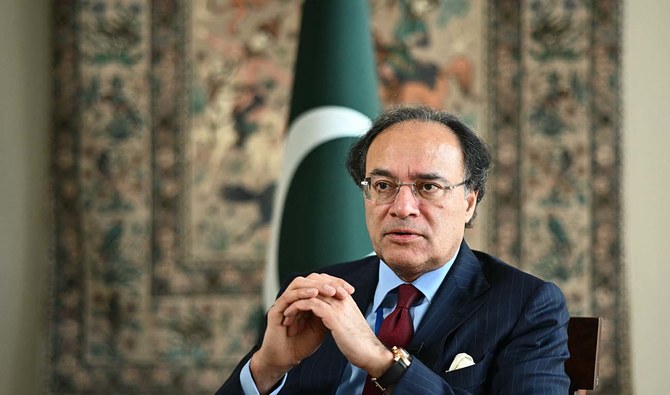
- Proceeds of green bonds used to finance climate change mitigation, adaptation and environmental projects
- According to recent World Bank study, Pakistan faces potential annual GDP losses of up to 1 percent due to climate-related risks
KARACHI: Federal Minister for Finance and Revenue Muhammad Aurangzeb said on Friday the Pakistan government was working to issue domestic green sukuk bonds by December 2024 to fund environmentally sustainable infrastructure projects.
The green sukuk is a Shariah-compliant interest-free bond in which instead of interest, investors receive an agreed share of the profits generated by the pool of underlying assets, which are partially owned by investors. Proceeds of green bonds are used to finance climate change mitigation and adaptation, and environmental projects.
“The government is working on issuing domestic green sukuk bonds by December 2024 to finance sustainable development projects,” Aurangzeb said as he delivered an online keynote speech at the UK-Pakistan Green Investment Forum, organized by the British High Commission in Pakistan.
In his address, the finance minister emphasized Pakistan’s commitment to addressing climate change and promoting green investment opportunities, and highlighted Pakistan’s vulnerability to the adverse effects of climate change, despite its low contribution to global greenhouse gas emissions.
According to a recent World Bank study, Pakistan faces potential annual GDP losses of up to 1 percent due to climate-related risks.
Acknowledging a significant funding gap in adaptation, resilience, and mitigation projects and the need for a better portfolio of green investment projects, the minister emphasized Pakistan’s reliance on the private sector for support in this regard and highlighted the government’s efforts to enhance investor confidence in bankable green opportunities.
He also outlined Pakistan’s plans to utilize innovative financing instruments like green sukuk to raise international climate finance.
Pakistan ranks among the top 10 countries worldwide most affected by climate change and natural disasters.
Iraq requests end of UN assistance mission by end-2025
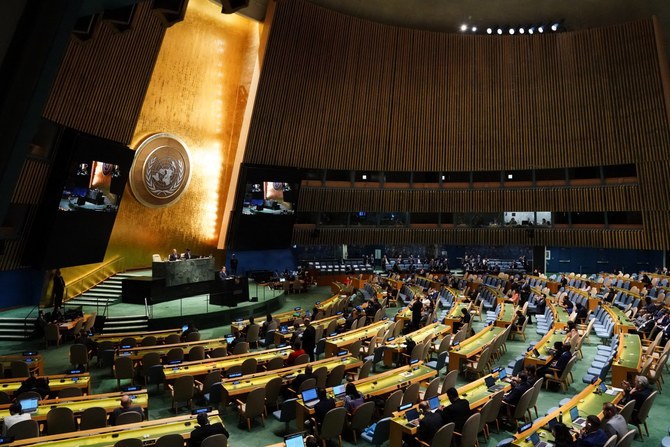
- Prime PM said Iraq wanted to deepen cooperation with other UN organizations but there was no longer a need for the political work of the UN assistance mission
BAGHDAD: Iraq has requested that a United Nations assistance mission set up after the 2003 US-led invasion of the country end its work by the end of 2025, saying it was no longer needed because Iraq had made significant progress toward stability.
The mission, headquartered in Baghdad’s heavily fortified Green Zone, was set up with a wide mandate to help develop Iraqi institutions, support political dialogue and elections, and promote human rights.
Prime Minister Mohammed Shia Al-Sudani said Iraq wanted to deepen cooperation with other UN organizations but there was no longer a need for the political work of the UN assistance mission, known as UNAMI.
The mission’s head in Iraq often shuttles between top political, judicial and security officials in work that supporters see as important to preventing and resolving conflicts but critics have often described as interference.
“Iraq has managed to take important steps in many fields, especially those that fall under UNAMI’s mandate,” Sudani said in a letter to UN Secretary-General Antonio Guterres.
Iraq’s government has since 2023 moved to end several international missions, including the US-led coalition created in 2014 to fight Islamic State and the UN’s mission established to help promote accountability for the jihadist group’s crimes.
Iraqi officials say the country has come a long way from the sectarian bloodletting after the US-led invasion and Islamic State’s attempt to establish a caliphate, and that it no longer needs so much international help.
Some critics worry about the stability of the young democracy, given recurring conflict and the presence of many heavily armed military-political groups that have often battled on the streets, the last time in 2022.
Some diplomats and UN officials also worry about human rights and accountability in a country that frequently ranks among the world’s most corrupt and where activists say freedom of expression has been curtailed in recent years.
Iraq’s government says it is working to fight corruption and denies there is less room for free expression.
Somalia’s government also requested the termination of a UN political mission this week. In a letter to the Security Council, the country’s foreign minister called for the departure of the Nations Assistance Mission in Somalia (UNSOM), which has advised the government on peace-building, security reforms and democracy for over a decade. He provided no reason.
Opposition leaders in Kashmir accuse Indian government of sabotaging their campaigns
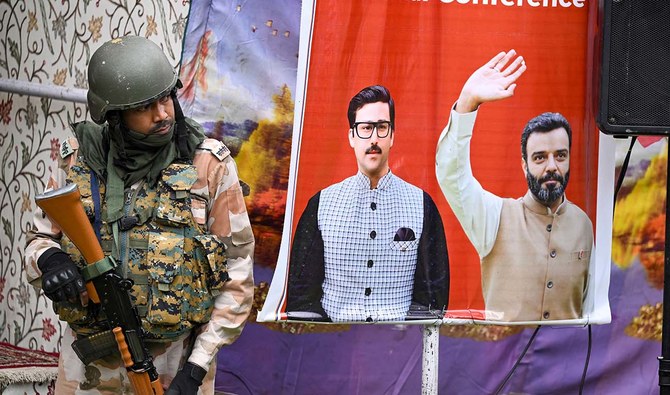
- Omar Abdullah says police canceled permissions for his rallies, asking him to reschedule without giving reasons
- Mehbooba Mufti of People’s Democratic Party also accused the police of not allowing her to hold campaign events
NEW DELHI: Opposition leaders in India’s troubled Kashmir valley have accused Prime Minister Narendra Modi’s administration of denying or canceling permissions to hold campaign events, to help his party’s “proxies.”
Omar Abdullah, a leader of the largest regional political party, the National Conference, said Modi’s government was trying to sabotage his campaign ahead of voting in the first of Kashmir’s three seats on Monday.
Modi’s Bharatiya Janata Party (BJP) is skipping elections in Kashmir for the first since 1996, which analysts and politicians in the region say belies his narrative of integrating Kashmir with the rest of the country and bringing peace and normality to the valley ravaged by a 35-year-old uprising against India’s rule.
In 2019, Modi revoked Jammu and Kashmir state’s partial autonomy, removed its statehood and divided it into two federally-controlled territories: Muslim-majority Kashmir with Hindu-dominated Jammu, and a mountainous Buddhist territory of Ladakh.
While the BJP has not fielded any candidate in Kashmir’s three seats, it has said that, as part of its grand strategy, it would instead support other smaller regional parties, without naming which.
In a letter to the federal poll watchdog, the Election Commission of India, on Thursday, Abdullah said the police, which are under the federal government’s control, canceled permissions for his rallies, asking him to reschedule without providing any reasons.
He said on social media platform X that it was done to help the BJP’s “proxy candidates.”
His rival Mehbooba Mufti, who heads the other regional political powerhouse the People’s Democratic Party (PDP), also accused the police of not allowing her to hold campaign events.
“This attitude of the police, in which they curtail our movement to support the proxy parties of the BJP, is against the guidelines of the Election Commission of India,” she said at a rally in Srinagar on Thursday.
V.K. Birdi, the police official responsible for Kashmir, did not immediately respond to a request seeking comment.
Both Abdullah and Mufti have said they were opposed to the BJP and would support an opposition Congress-led alliance of more than two dozen parties federally.
The state unit of the election watchdog has also asked PDP’s Srinagar candidate, Waheed ur Rehman Para to refrain from calling this election a “referendum” against scrapping of semi-autonomy of the region in 2019 in his speeches.
While Srinagar will vote on May 13, the elections in the other two seats will be held on May 20 and 25.
Nuclear-armed neighbors India and Pakistan control parts of Kashmir, but claim it in full, and have fought two of their three wars over the region.


